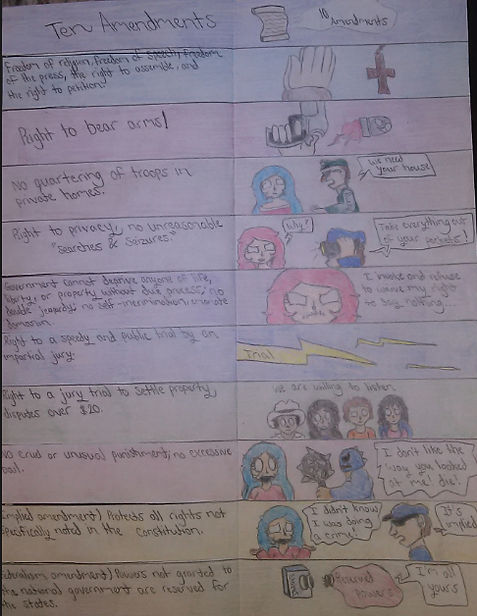
Federal Government Seperation of powers
Executive Branch
2, 3, 4, 9
judicial Branch
1, 6, 10
Legislative Branch
5, 7, 8, 11
1. Members of this branch examine laws to see if they are constitutional.
2. The head of this branch chooses women and men to serve as judges.
3. This branch is in charge of dealing with other countries.
4. The commander-in-chief of the armed forces is in this branch.
5. Members of this branch pass the nation's laws.
6. This branch is made up of the federal courts.
7. The head of this branch can veto laws passed by congress.
8. Members of this branch must approve the Presidents treaties.
9. Members of this branch are responsible for carrying the nation's laws.
10. Members of this branch approve the women and men chosen to be judges.
11. Members of this branch can pass amendments to the Constitution, with the approval of three-fourths of the states.
How free is free speech in America?
This article talks about three cases that I found quite interesting and I feel they are serious matters that should be catching attention. One is about a woman who woke up hearing loud knocking on her door. The cops broke down her door, made her and her son step aside while they took all their computers, cellphones, and files, and they told the family they could not tell anybody about the investigation or they would be arrested and taken to jail without even informing her why.
The second story follows a boy named Noah who was in pretty much the same situation. He wanted to call his parents but they would not let him call them or anyone for that matter, not even a lawer. After hours they finally let him leave to school but warned him not to tell anyone about the police. He was two hours late for school and his teacher of course asked him why he was late. He was not able to say the truth as the police had warned him to not say anything about what was happening to him so he answered with “I cannot say.”
Another one included John Doe who had to live knowing the state was investigating the entire family and were forced into silence, they were forbidden by the government to say anything. The forced silence went on lasting for five years until Wisconsin’s Supreme Court ordered the john Doe investigations stopped.
This article heavily relates to the first amendment of the bill of rights stating: Congress shall make no law respecting an establishment of religion, or prohibiting the free exercise thereof; or abridging the freedom of speech, or of the press; or the right of the people peaceably to assemble, and to petition the Government for a redress of grievances. It’s direct relation to the first amendment is the part of freedom of speech not just because it is on the title but because of the fact that the right of freedom of speech was violated when forcing the people to not talk about what was going on to anybody. The freedom of the press was also violated as the police also refused to tell them why they were being forced into silence and investigation.
Bill of Rights Booklet

